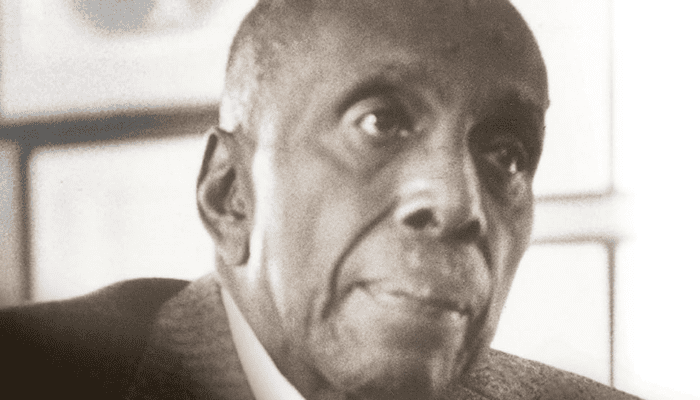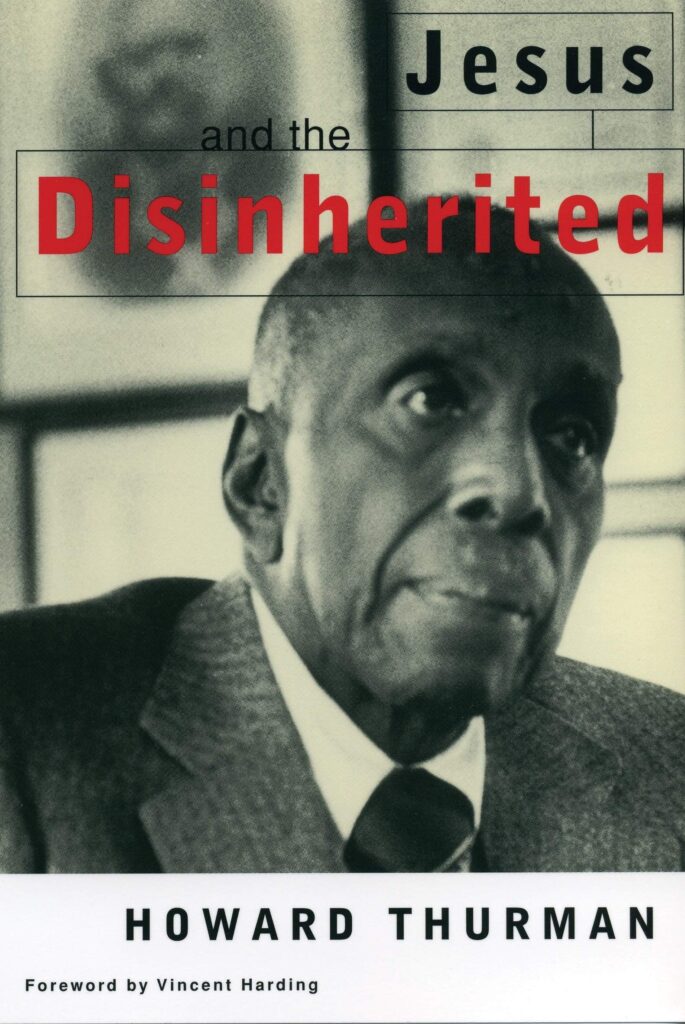
Thurman’s Rigorous Ethic of Reverence for Each Person

By David Sawyer
In 1968, at the peak of the civil rights campaign and in the heat of the protests against the war in Vietnam, Dr. Albert Curry Winn, President of the Louisville Presbyterian Seminary, decided that his white, tending-toward liberal, students needed to “learn how to pray.” So, he convinced America’s most illustrious expert on spirituality, Howard Thurman, at that point in his retirement doing guest professorships around the country, to spend a semester in Louisville as Visiting Professor of Spiritual Disciplines.
And that’s how I had the blessing of studying with Thurman in my senior year of seminary. In his class on Spiritual Disciplines, I absorbed his practice of and recommended techniques for meditation. I was in awe of each of his Friday Chapel sermons. Volunteering to assist him in planning a student retreat, I got to sit in his office and interact with him. He was warm, personable, funny, and laser sharp in his focus. I felt the deep wisdom and power of his inner life and his loving passion for the spiritual life of our seminary.
Those experiences of his mystical sensibility have shaped my life of communion with the Holy ever since. I have continued with mixed results to practice meditation and spiritual growth for myself, and I also taught it also for my congregations, my students, and for ministerial colleagues. The most enduring effort at Thuman-inspired, life-long practice of prayer and spirituality is a group of men, all of us now retired Presbyterian ministers, who have been meeting monthly for retreat for 40 years.
 This reflection on Thurman’s Jesus and the Disinherited coincides with what I consider to be a capstone of my ministerial and teaching career. I’m teaching a course at Simmons College of Kentucky, Louisville’s HBCU, titled “Howard Thurman, The Inner Quest and the Pursuit of Justice.” This group of senior religious-studies majors have studied Jesus and the Disinherited in other classes but this is their first deep dive into not only that book, but Thurman’s spirituality, his life and times, his theology, and his impact on Black life in the 20th century.
This reflection on Thurman’s Jesus and the Disinherited coincides with what I consider to be a capstone of my ministerial and teaching career. I’m teaching a course at Simmons College of Kentucky, Louisville’s HBCU, titled “Howard Thurman, The Inner Quest and the Pursuit of Justice.” This group of senior religious-studies majors have studied Jesus and the Disinherited in other classes but this is their first deep dive into not only that book, but Thurman’s spirituality, his life and times, his theology, and his impact on Black life in the 20th century.
So out of that pedagogical crucible, I would like to offer a few thoughts to Christian ethicists today about Jesus and the Disinherited. Remember, the book was the product of over fifteen years of thinking, writing, teaching, preaching, and writing about the topic. In just over a hundred pages, Thurman presented a carefully and compact case for an ethical living for people “with their backs against the wall.” I find his argument persuasive for anyone, oppressed or privileged, searching for a way to live with integrity in the 21st century. I present here my inevitably white distillation of what I call his revolutionary ethic.
A lifetime of reflecting on the story, the message, and the person of Jesus led Thurman to a radical understanding of Jesus. Thurman realized that in his historical context, Jesus was a poor Jew of Judea in a time when his country was completely under the oppressing thumb of the Roman Empire. Yet, Thurman called him “so perfect a flower from the brooding spirit of God in the soul of Israel” (p. 60). He imagined Jesus reflecting deeply on the prophetic genius of his Jewish tradition and bringing to his people a radical ethic of love in the face of the three Hounds of Hell in Jewish life: fear, deception, and hatred. Simply stated Jesus’ ethic was to “fear no man,” “let your yes be yes and your no be no,” and “love your enemies.” His reason for advocating such an extreme perspective was to encourage a life of complete integrity, when that’s all people with their backs against the wall have. His message was consistently to live your life for and with God, and trust God’s care, truth and love. To live otherwise is to allow the corruption of the oppressors to destroy the soul, the “core” of human life (p. 76).
This message of Jesus, in fact, has resonated with troubled souls, oppressed women and men, and also privileged women and men over time. It is truly a liberating theology. However, the adoption of a dominance system in Western Christianity based on power and guarantees of doctrinal purity instead of inner integrity and purity of love, has muted that message for those of us who have accepted the ways of comfort and wealth. I remember as a child reading the stories of Jesus and recognizing the disconnect between his actual life circumstances and the assumption of easy advantages of class and race. I knew instinctively that the interpretations given to me in my Sunday School classes were not fully in line what I read in the Bible. But I did not have the courage to challenge them. I could not accept the simple ethic of Jesus. I did not challenge them until much later in my life. Today, Thurman gives me that courage.
A reader of Jesus and the Disinherited in the 21st century has to ask how the rigor, the stark essence, of Thurman’s ethic are possible. Studying and teaching about Thurman afresh this year, I understand that following such an ethic is possible only if accompanied by two foundations of Thurman’s life and work. One is a deep spiritual maturity through study, prayer and meditation so that when turbulence comes it can be met with what the Buddhists call “equanimity” and the twelve-step method calls “serenity.” I understand those words to describe an inner ability to respond to each difficulty with the double awareness that one belongs to the universe and that “this, too, shall pass.” So, Thurman could say at the end of his Autobiography:
The older I have grown, the more it is clear that what I needed to hold me to my path was the sure knowledge that I was committed to a single journey with but a single goal—a way toward life…What I did with my life had to be secure in the inclusive sense that only the word “total” can signify. (WHAH, p 266)
The second foundation for living out his ethic is the persistent belief that every human being is a beloved child of God, including oneself. In The Luminous Darkness (1965) Thurman updated his thoughts about segregation in America. In the Foreword he wrote:
The fact that the first twenty-three years of my life were spent in Florida and in Georgia has left its scars deep in my spirit and has rendered me terribly sensitive to the churning abyss separating white from black. Living outside of the region, I am aware of the national span of racial prejudice and the virus of segregation that undermines the vitality of American life. Nevertheless, a strange necessity has been laid upon me to devote my life to the central concern that transcends the walls that divide and would achieve in literal fact what is experienced as literal truth: human life is one and all [humans] are members of one another. And this insight is spiritual and it is the hard core of religious experience.” (TLD, p x)
Thurman inspires me to believe that with devotion to a spiritual discipline that leads to equanimity, and with a “hard core” conviction that the primary task of life is building relationships of respect and acceptance with other people, one can live with integrity and love.
There are many possible applications in these reflections on Thurman. Here is the one at the top of my mind in this season of a United States presidential election in 2024. Following Thurman’s thought, I believe the current progressive response to Donald Trump’s MAGA campaign is wrong. It is too small a thing to counter his super-nationalist, white-supremacist, pseudo-evangelical movement characterized by hate, grievance, and revenge with “save our democracy.” Democracy is a relatively recent experiment in government, and it will always need attention and refinement. But it is not an ultimate commitment. Thurman prompts us to ask what is the deeper, lasting commitment to ordering human society that needs to be promoted at this moment? At base I think it needs to be organizing our society around the values of accepting, respecting, and honoring every human and expecting citizens to treat each other as equally valuable without regard to age, gender, skin-color, language, culture, or ability. Thurman, who referred to the value of each individual as “personality,” summarizes his argument in Jesus and the Disinherited this way:
The concept of reference for personality, then, is applicable between persons from whom, in the initial instance the heavy weight of status has been sloughed off. Then what? Each person meets the other where he (or she) is and there treats (each) as if he (or she) were where (they) ought to be. Here we emerge into an area where love operates, revealing a universal characteristic unbounded by special or limited circumstances. (p. 94)
In my experience as a consultant to churches in conflict, I often suggested a simple seven-word phrase to counter behavior of anger, grievance, and revenge, “We don’t treat each other that way.” It is an ethical response that I believe is in the spirit of Thurman’s “reverence for personality.” What would happen if progressives of all stripes called out the former president and his acolytes without hate or judgement, offering some kind of respectful reminder of the boundaries of decency and respect due to each person in this country? That is bigger than democracy. It is bigger than even Christianity. It is the heart and soul of what Thurman called “the hard core of religious experience.”
— David R. Sawyer (Ph.D.) is retired Professor of Church Leadership and Administration at Louisville Seminary and former Adjunct Professor of Religious Studies at Simmons College of Kentucky.
REFERENCES
Thurman, Jesus and the Disinherited, Boston: Beacon Press, 1976, pages cited in parentheses.
Thurman, The Luminous Darkness: A Personal Interpretation of the Anatomy of Segregation and the Ground of Hope, Richmond, IN: Friends United Press, 1965, cited as TLD.
Thurman, With Head and Heart: the Autobiography of Howard Thurman, New York: Harcourt Brace and Jovanovich, 1979, cited as WHAH.
Leave a Reply
You must be logged in to post a comment.


